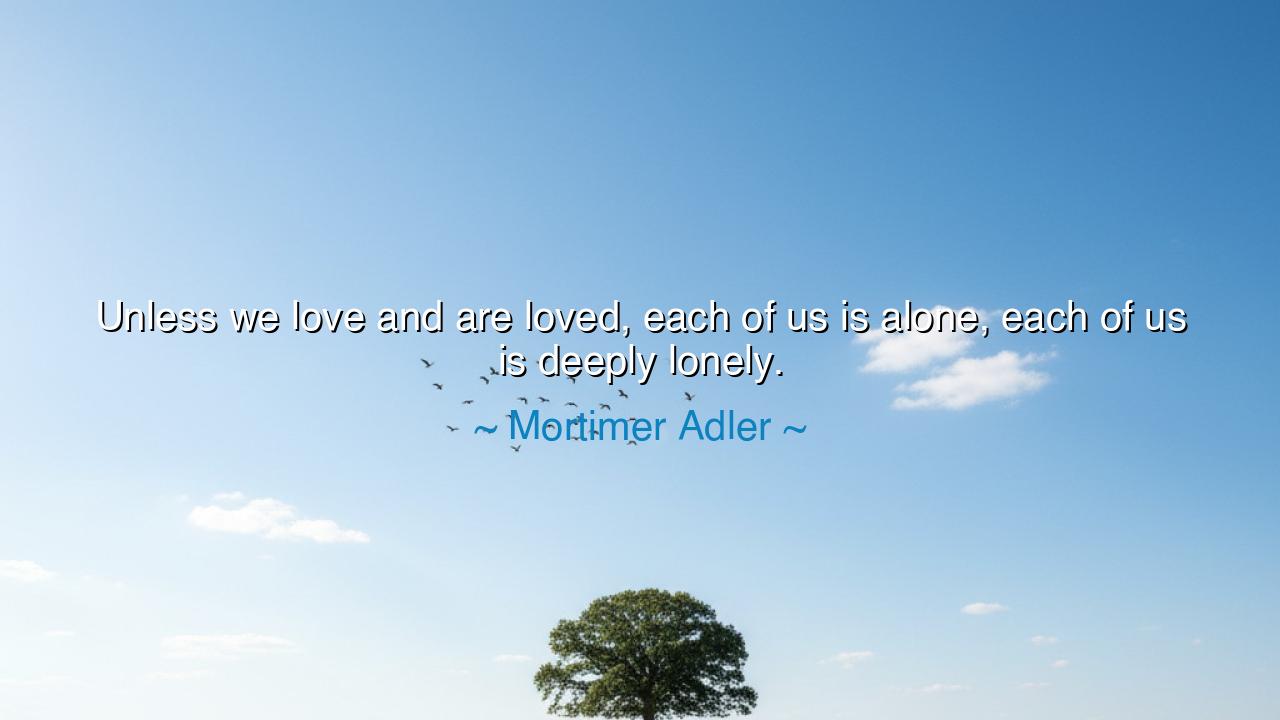
Unless we love and are loved, each of us is alone, each of us is






“Unless we love and are loved, each of us is alone, each of us is deeply lonely.”
Thus wrote Mortimer Adler, the philosopher and educator whose wisdom bridged the worlds of intellect and heart. In these few words, he distilled one of the oldest and most tender truths of existence: that love is not merely an emotion or desire, but the very force that binds human souls together, lifting them from the shadow of isolation into the light of shared being. Without love — given or received — a person may live, work, and speak, yet inwardly remain alone, cut off from the living stream of humanity. Adler’s words are not sentimental, but sacred, for they remind us that no intellect, no wealth, no achievement can substitute for the grace of love.
To love and be loved is to participate in the divine rhythm of life itself. Love is the bridge between souls, the fire that melts the walls of the self, allowing us to see another as part of our own being. Without it, even surrounded by people, one feels a hollowness that no noise can fill. Adler understood this not only through philosophy but through his reflections on the nature of the human heart. As a scholar who wrote deeply about ethics and happiness, he saw that fulfillment does not arise from power or pleasure, but from connection — the mutual recognition that we exist for one another.
This teaching is as ancient as it is eternal. The philosopher Aristotle, whom Adler admired, spoke of philia — the noble friendship that forms the foundation of community and virtue. To Aristotle, friendship was the truest form of love, for it was rooted in mutual goodness. The mystics of the East said much the same: the Upanishads declare that the self is realized only through union — that “when the One becomes two,” meaning awakens. And the Christ, centuries later, echoed this eternal wisdom: “Love one another as I have loved you.” Thus, from Athens to Jerusalem to the present age, the same truth resounds — love is the antidote to loneliness, and those who close their hearts to it close themselves to life.
History offers countless examples of this truth in action. Consider the life of Mother Teresa, who walked among the poorest of the poor in Calcutta. She was surrounded by suffering and death, yet she was never truly lonely, for her heart overflowed with love. Her service was not merely charity; it was communion. She once said, “The most terrible poverty is loneliness, and the feeling of being unloved.” In this she embodied Adler’s insight — that the human soul thrives not in comfort, but in connection. Through love, she turned desolation into sacred purpose.
Yet Adler’s words carry also a warning. To live without love, even in the midst of abundance, is to live as a ghost among the living. Many today, surrounded by technology and busyness, find themselves haunted by this very loneliness — the ache of disconnection that no entertainment or success can soothe. The soul longs not for applause, but for affection; not for victory, but for understanding. The one who loves but is not loved grows weary; the one who receives love but does not give it grows hollow. Only when both flow together does the heart find peace.
To love and be loved, however, requires courage. It means allowing oneself to be seen, to be vulnerable, to risk rejection for the sake of truth. The fearful heart builds walls to avoid pain, but those walls become prisons. The open heart, though wounded, becomes radiant. Adler’s message, therefore, is not only philosophical but deeply practical: love must be lived as an act of will — a daily choosing to care, to forgive, to connect, even when it is difficult.
The lesson of this quote is as vital now as it was in ages past: seek not to conquer the world, but to belong to it. Cultivate compassion — for others, and for yourself. Speak kindness where there is silence; offer comfort where there is despair. Do not hoard love like a treasure, but pour it freely, for in giving you are enriched. And when you find yourself lonely, remember that love begins within — that the heart which loves deeply will never be truly alone, even in solitude.
So, my child of tomorrow, take this wisdom to heart: unless we love and are loved, our lives are but shadows, and our souls wander without rest. But when love enters — humble, steadfast, divine — the prison of loneliness breaks open, and we find ourselves not merely among others, but one with them. For in the end, love is not only what saves us from loneliness — it is what makes us human, and what leads us, together, toward heaven itself.






AAdministratorAdministrator
Welcome, honored guests. Please leave a comment, we will respond soon